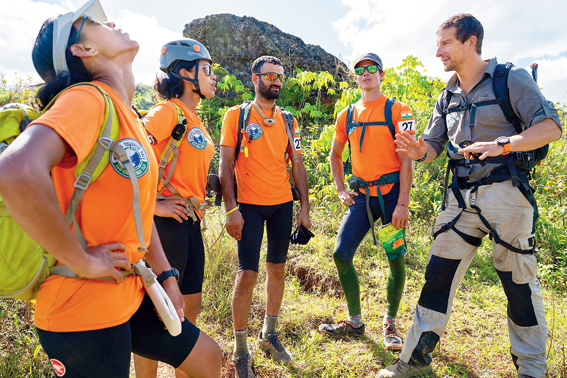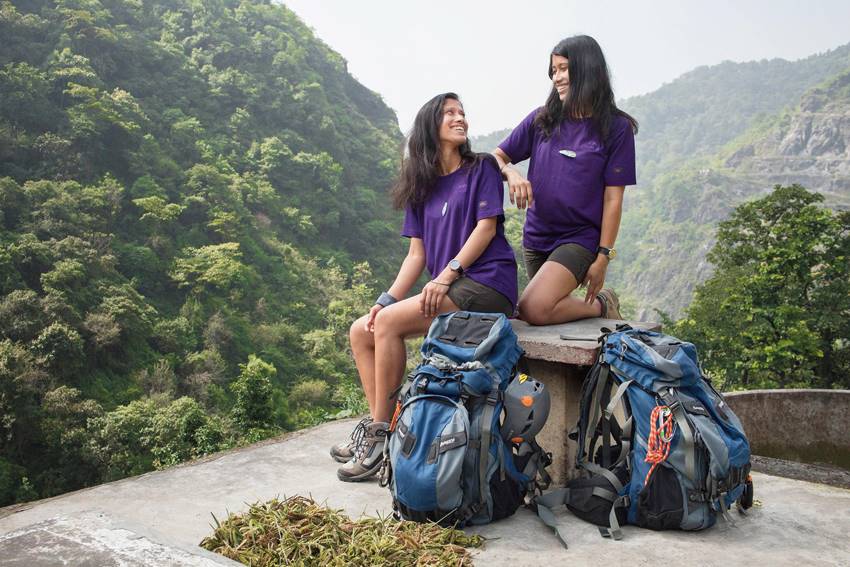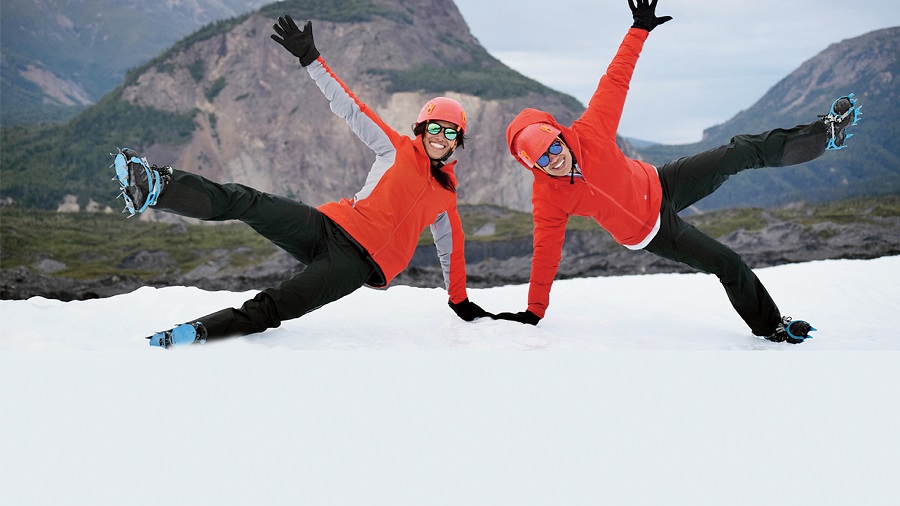The year was 2013. Sisters Tashi and Nungshi Malik, then 21, set off to climb Mount Everest. Before leaving, they silently left a letter in their parents’ room, just in case they didn’t make it back. Tashi and Nungshi not only summited Everest, becoming the first twin sisters to do so, but also went on to complete the Adventurers Grand Slam, climbing the highest peak on each of the seven continents and travelling on foot to the North and South Poles. This year, Tash and Nash — as they are called — were honoured with the Nari Shakti Puraskar, one of the highest awards for women in India.
Now the twins, aged 29, are part of Khukuri Warriors, a four-person team that’s participated in the adventure reality race World’s Toughest Race: Eco-Challenge Fiji. The 10-episode series, streaming on Amazon Prime Video, has 66 teams from 30 countries racing non-stop for 11 days across 670 kilometres of inhospitable terrain. They are the first and only South Asians to participate in this global adventure race. Over a video call, we chatted with Tash and Nash, who live in Dehradun, on what sets their adrenaline pumping and why they continue to break one ice ceiling after another.
Having already achieved so much and overcome unthinkable barriers both physical and psychological, what made you sign up for World’s Toughest Race: Eco-Challenge Fiji?
Nungshi Malik: Before this, we had been purely branded as ‘mountaineers’. The primary motivation to doing Eco-Challenge was to do something different, something that we had no prior experience of, and see how far we would go on the show, as complete rookies and novices, so to speak. We just wanted to set a higher benchmark for ourselves and prove to people that even a difficult endeavour like Eco-Challenge is possible if you honestly say ‘yes’ to it.
Climbing mountains is part of our comfort zone, even something like (Mount) Everest. We had the experience, we had the necessary skills… whatever we have done so far has been in terms of building on our strength of the past. But we were constantly feeling the need to really push ourselves to the limits of physical, mental and emotional endurance. From this experience, we wanted to take away the know-how of what we were capable of in different disciplines. Eco-Challenge didn’t just involve climbing, sailing… one needed to be consistent in different disciplines. And for us to take on that challenge like complete novices was extremely, extremely difficult.
In fact, to be very honest, this was one event we were totally unprepared for, unlike our other missions and challenges where we have spent a lot of time developing our training schedules. Our knowledge of this kind of adventure was practically zero… our training and preparation for it was also zero, other than the mandatory certifications in certain disciplines that we had to furnish and some basic training that we had to undergo. We had no idea how the race would unfold, and from the beginning to the end, it just seemed like an impossible mission. It was quite daunting, this tested our nerves like none other.
Did your instincts make up for the lack of preparedness?
Tashi Malik: It’s hard to answer that question, but yes, I think so. As much as we say we went under-prepared and we didn’t know how it would unfold, I think what we mostly felt during the course of this race was, ‘I can push through this’. We had teams ahead of us and some behind us, but there was this drive in us, a kind of energy that made us want to step up. We knew we were part of something big. This race tested us to the extremes of physical and mental capacity. So yes, intuition and instincts came into play as well as a bit of curiosity in terms of testing how far we could go.
Nungshi: I think we just continued with the single-mindedness that, ‘We are going to keep moving till we drop’. Quitting was just not an option… we were only looking to keep moving and pushing ourselves, even when we felt our hands and feet were giving up on us. That’s because we had a bigger mission in mind… and that was to inspire our girls in India. And we were not going to give up any opportunity to demonstrate that girls are made of steel. So giving up was never on the cards, though we knew in our hearts and minds that this could imminently kill us!

Tashi and Nungshi Malik and their teammates have a word with Bear Grylls on World’s Toughest Race: Eco-Challenge Fiji, streaming on Amazon Prime Video Sourced by the Telegraph
What was it like having Bear Grylls, the foremost name when it comes to survival and adventure, race with you every step of the way?
Nungshi: Oh, huge! I think there were some contestants who were there just to see him, rather than compete. He’s a great human, his presence on the course really uplifted our spirits. Some of the things he said were really profound that kept us going, coming as it did from experience and depth. He’s incredible at what he does.
Tashi: He’s a great motivator and at some point, we knew that we had to impress Bear as well. He was constantly watching us. So we were like, ‘Hey Bear! Hope you are watching us and our struggle!’
Having been a team for so many years, what would you count as your individual and collective strengths?
Tashi: Endurance binds the two of us together. Being together as a team counts for us. Even on this show, we knew teamwork was important because we were not operating as a team of two but as a team of four (the Malik twins were accompanied by dad Colonel Virendra Singh Malik and skiing and rafting expert Praveen Singh Rangar) and we knew that if even one of us was injured or fell sick, all four of us would have to leave the race.
Nungshi: Perseverance holds the key for me as an individual. Pushing on has always been my strength. On this race, there were moments where I couldn’t even feel my tongue! Even now, when I try and recollect some moments from the race, I am unable to because I was semi-conscious. Now people tell us that there were points where we looked like zombies, we had nothing left in us. But there was obviously something supernatural, something beyond, that was guiding us to the finish line.
There was something beyond our physical ability that was driving us. As a team, we are always professional enough to ensure that we will do the best we can to survive and to help each other survive. One thing that we have both learnt from our various adventures is that it’s not just important to reach the summit of a mountain… you also need to come back safe and alive.
There must be days when you feel vulnerable. How do you prop each other up?
Nungshi: Just by saying, ‘Girl, you are probably going through the same thing as I am going through!’ (Laughs) We are the kind of twins who biologically feel each others’ pain, we go through the same emotions as the other does. Our suffering, internally and externally, is the same. We constantly look at each other and go, ‘You are really strong! You can do it!’ If she has a swollen face, you will find me with a swollen face within minutes. If she has tears in her eyes, I will automatically have tears rolling down my cheeks in seconds, even if I don’t want to! (Laughs) Being the older twin by 21 minutes, for me, it’s always been about taking care of my sister, I always feel a little more responsible towards her. So I keep telling her that she’s awesome!
Is endurance an indelible part of your DNA or was there a point in time when you arrived at it?
Nungshi: I think all of what we are is an evolution. We didn’t know that we would become mountaineers and when we did, we didn’t understand what amount of resilience it would demand from us. In India, one also has to deal with stereotypes as well the naysayers that girls can’t take on a physically demanding task. That adventure and mountaineering is a male preserve and that girls can’t do it. There are so many things that we have learnt over time and with experience. We’ve been climbing for the last 10 years… we’ve had close brushes with death and we’ve had moments where we have lost close friends. Not only as adventurers, even as humans, we constantly evolve with these emotions. It doesn’t happen overnight. For us, it’s been a great learning curve. We learn something new every time, with everything you are exposed to, you learn something about yourself. Fear is something we constantly face, but the key has been in understanding it and mastering it… it has taken us a lot of time to do so.
Tashi: Growing up, we were quite fit, we were athletic and ended up playing a lot of sports, especially athletics. It’s a lifestyle, you know. We’ve haven’t arrived at this suddenly. Our parents, especially dad, have been a huge support and inspiration, always telling us that hard work pays off, but he’s always encouraged us to do everything. His words to us have always been, ‘You can find time to party and you can always find time to work out’.
Is gender discrimination still a struggle?
Nungshi: Oh ya, it’s constantly around us. Even after being there and having done that, there are still people who tell us not to go for the next summit climb or do a brutal challenge. But we’ve never let that fear set in, the fear of what the naysayers can do to you. Over time, we have learnt to surround ourselves with people who really believe in our mission.
But the truth also is that when someone smashes a record on a global level and comes home — men or women — the whole nation celebrates. The achievements are definitely celebrated, but there are also those naysayers who try to bring you down. The whole idea is to keep raising our benchmark, so that each time we go on a mission, we make a statement. That these girls can do it and that they have been proving themselves over and over again. The negativity from some quarters is the extra pressure we always go in with, but we are also mindful of the fact that when we climb a mountain, the whole nation is lifted.
Is there a five-year plan?
Nungshi: Our life is always on the run, we are quite spontaneous with the opportunities that come our way. Eco-Challenge happened out of nowhere... we never saw ourselves doing 670km day and night, through jungles and oceans and rivers.... We are expanding on the programmes of our Outdoor Leadership School (in Dehradun) and trying to provide a platform to the next generation who have a passion for adventure. We are also looking at different opportunities across the globe to keep representing India and keep pushing our boundaries. A big part of us is also philanthropic... we try and give back as much as we can. With our experience and expertise in mountaineering, we continuously look to do things that propagate the love for adventure. For now, we are writing a book on our hugely transformative experience of doing the Eco-Challenge. We are quite excited about that.
When you aren’t jumping from one summit to another, what do you like doing?
Tashi: Oh, we love to dance! Growing up, we did a lot of Bharatanatyam. We are great dancers, people always expected us to dance on the big stage. Dad was in the army, so we got to experience the cultural diversity of India that included different forms of dancing. If we weren’t climbers, we would have been dancers, for sure. Nash is great at painting, but dance is the way we express ourselves, right after adventure. We are also big on fitness. Our motive right now is to gain weight, because our adventures make us lose a lot of weight. Right now, we are seriously focusing on eating a lot of oily parathas!

Tashi and Nungshi Malik Sourced by the Telegraph
Know Tash and Nash
Age: 29
Education:
- Degree in journalism and mass communication. Certificate in Peace and Conflict Resolution from School of International Training in Vermont. They have also graduated in sport and exercise from Southern Institute of Technology in Invercargill, New Zealand.
Achievements:
- The first twin sisters to conquer Mount Everest, the first female twins to complete Seven Summits, complete the Explorers Grand Slam and the youngest to complete the Three Pole Challenge.
- Conferred India’s highest adventure honour ‘Tenzing Norgay National Adventure Award’ 2015. In 2016, they were awarded the Leif Erikson Young Explorers Award in Iceland by president Guoni Th. Johannesson.











